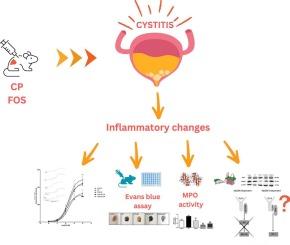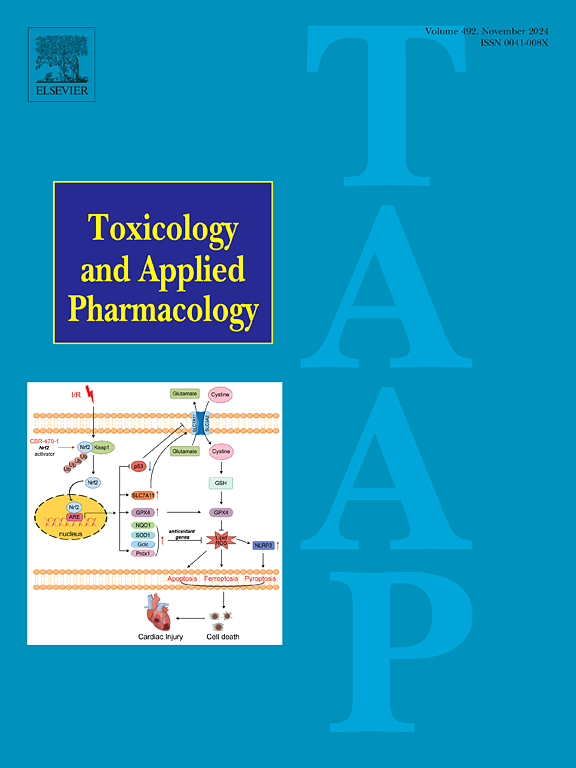福沙匹坦通过减轻炎症反应改善环磷酰胺诱发的小鼠膀胱损伤。
IF 3.3
3区 医学
Q2 PHARMACOLOGY & PHARMACY
引用次数: 0
摘要
抑制炎症过程是治疗间质性膀胱炎(IC)的关键治疗目标。最近的报道表明,神经激肽 1 受体(NK1R)拮抗剂对炎症性疾病有益。在此,我们研究了 NK1R 拮抗剂福沙匹坦(FOS)对环磷酰胺(CP)诱导的膀胱炎的保护作用。小鼠膀胱炎模型的建立是多次注射环磷酰胺(80 毫克/千克;静注),每次间隔一天,然后连续七天用 FOS(20 和 60 毫克/千克/天;静注)治疗。对小鼠膀胱的逼尿肌收缩力、膀胱血管通透性、髓过氧化物酶(MPO)活性和 TLR4 通路的蛋白表达水平进行了评估。卡巴胆碱和电场刺激诱发的小鼠逼尿肌收缩明显增加,而 FOS(60 毫克/千克/天)治疗可明显减弱(p˂0.001, p˂0.05)。值得注意的是,在 CP 诱导的膀胱炎中,膀胱血管通透性明显受损,而 FOS(60 毫克/千克/天)治疗可使其恢复(p˂0.01)。膀胱炎组的 MPO 活性明显升高,而 FOS(20 和 60 毫克/千克/天)治疗可明显抑制膀胱组织中的 MPO 活性(p˂0.001)。虽然TLR4的表达随膀胱炎而增加,但MyD88和p-NFκBSer536/总NFκB没有变化,FOS(20和60毫克/千克/天)治疗使TLR4的表达急剧下降(p˂0.001),这表明FOS具有抗炎作用。总之,FOS通过抑制MPO活性和TLR4表达,改善了逼尿肌过度活动和炎症反应,从而使CP诱导的膀胱炎患者的功能和组织学得到恢复。本文章由计算机程序翻译,如有差异,请以英文原文为准。

Fosaprepitant improves cyclophosphamide-induced bladder damage by alleviating inflammatory response in mice
Inhibition of inflammatory process is a key therapeutic target for the treatment of interstitial cystitis (IC). Recent reports indicate that neurokinin 1 receptor (NK1R) antagonists have beneficial roles in inflammatory-based diseases. Herein, we investigate the protective effects of fosaprepitant (FOS), a NK1R antagonist, in cyclophosphamide (CP)-induced cystitis. The cystitis model was established multiple CP (80 mg/kg; i.p.) injection one day apart, and mice were treated with FOS (20 and 60 mg/kg/day; i.p.) for seven consecutive days. Detrusor contractility, vesical vascular permeability, myeloperoxidase (MPO) activity and protein expression levels of the TLR4 pathway were evaluated in mice bladder. Carbachol and electric field stimulation-evoked contractions of detrusor strips were significantly increased in CP-treated mice, which was significantly attenuated by FOS (60 mg/kg/day) treatment (p<0.001, p<0.05). Notably, vesical vascular permeability was markedly impaired in CP-induced cystitis, that was restored by FOS (60 mg/kg/day) treatment (p<0.01). MPO activity was significantly increased in cystitis group whereas FOS (20 and 60 mg/kg/day) treatment remarkably suppressed MPO activity in bladder tissue (p<0.001). Although TLR4 expression increased with cystitis, MyD88 and p-NFκBSer536/total NFκB did not change, FOS (20 and 60 mg/kg/day) treatment caused a dramatic decrease in TLR4 expression (p<0.001), indicating the anti-inflammatory effect of FOS. In conclusion, FOS improved detrusor overactivity and inflammatory response by inhibiting MPO activity and TLR4 expression, resulting in functional and histological recovery in CP-induced cystitis.
求助全文
通过发布文献求助,成功后即可免费获取论文全文。
去求助
来源期刊
CiteScore
6.80
自引率
2.60%
发文量
309
审稿时长
32 days
期刊介绍:
Toxicology and Applied Pharmacology publishes original scientific research of relevance to animals or humans pertaining to the action of chemicals, drugs, or chemically-defined natural products.
Regular articles address mechanistic approaches to physiological, pharmacologic, biochemical, cellular, or molecular understanding of toxicologic/pathologic lesions and to methods used to describe these responses. Safety Science articles address outstanding state-of-the-art preclinical and human translational characterization of drug and chemical safety employing cutting-edge science. Highly significant Regulatory Safety Science articles will also be considered in this category. Papers concerned with alternatives to the use of experimental animals are encouraged.
Short articles report on high impact studies of broad interest to readers of TAAP that would benefit from rapid publication. These articles should contain no more than a combined total of four figures and tables. Authors should include in their cover letter the justification for consideration of their manuscript as a short article.

 求助内容:
求助内容: 应助结果提醒方式:
应助结果提醒方式:


